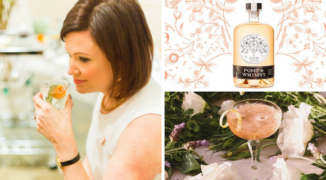Last month, Drinks International released the results of their annual report, wherein the publication surveyed 100 bars around the world for their most-requested Scotch. The resulting title of “World’s Trendiest Scotch Whisky,” as ScotchWhisky.com reported, went to Monkey Shoulder: a brand launched by William Grant in 2005 as a blend of three single-malt Scotch whiskies from their three Speyside distilleries (Glenfiddich, Balvenie, and Kininvie), aged in first fill bourbon casks and blended by Brian Kinsman. In an ever-crowding category that continues to be dominated by the big names (many of whom have been around for more than a century), we had to ask: what’s the secret to this particular brand’s rousing success?
The answer, it seems, is accessibility. In a category that often feels intimidating to newcomers, Monkey Shoulder positions itself as the modern answer, equally enjoyable to Scotch connoisseurs as it is to cocktail-drinkers. “Monkey Shoulder was created to give people who don’t already drink Scotch an introduction to the category that feels natural and suits their existing drinking habits,” explains Dean Callan, the brand’s global ambassador. Rather than leaning on convoluted lore, Monkey Shoulder simply presents itself as a top-notch, easy-drinking whiskey with no pretense. That message seems to be working.
Dave Broom, author of “Whisky: The Manual” and founder of ScotchWhisky.com, also attributes the brand’s success to its un-stuffiness — and, of course, to the quality of the product itself. “It’s amenable,” he says. “That doesn’t mean it’s simple, rather it has a gentle sweetness that makes it a great base for great drinks.”
Monkey Shoulder’s unique position and widespread success isn’t just shaking up the way Scotch is perceived amongst consumers; it’s also changing the way Scotch is viewed (and used) behind the bar, too. “In a way, it is the perfect reflection of the changing image of Scotch whisky among bartenders,” he says. Broom explains that a mere 18 months after Monkey Shoulder launched, there was a risk that it was going to be pulled because, at the time, there was little interest in mixing with Scotch. But William Grant persevered. “Now, Scotch is seen as a valid base spirit for great drinks, and Monkey, because it’s been pushing this angle, is benefiting,” he explains.
While some prestigious Scotch brands might shy away from the idea of using their spirits in a cocktail, Callan says it’s that very openness and flexibility that’s helped to encourage more and more bartenders to reach for Monkey Shoulder when mixing drinks. “The thing that makes Monkey Shoulder special is the flexibility we have,” he says. “By embracing cocktail and mixed drinks, we open our drinkers up to many more occasions and flavors than would be otherwise available.”
Aside from the casual Scotch enthusiast, what makes Monkey Shoulder such a hit among bartenders? Callan chalks it up to the fact that Monkey Shoulder has the “geek appeal” for aficionados, the accessible taste that a Scotch newcomer can appreciate, the versatility that a bartender requires when mixing, and the price point that makes sense for everyone involved. “If you are designing a menu or stocking your back bar, you need a range of spirits that appeals to the super geeky spirits enthusiast as well as the drinker out to have a good time. Monkey Shoulder is a blended malt, which is a relatively rare type of whisky, and that appeals to the geeks desire to try new things,” he says. Plus, he adds, “it’s also tasty [served] neat, and affordable enough to play with in cocktails which appeals to those out to have a good time and simply drink something tasty. This means it’s a bottle that a bartender can rely on, and that goes a long way.”
In short? Monkey Shoulder is, at the end of the day, a very good product, regardless of its smart marketing. Dave Broom agrees. “The inherent quality of the product is the ultimate reason why people drink it,” he says. “It doesn’t matter how slick the marketing is… if the juice isn’t good then eventually people will stop buying. I still enjoy a dram of Monkey. It’s fun and has quality — and that’s not a combination you see often in Scotch, sadly.”
Curious? Try Dean Callan’s current favorite way to enjoy Monkey Shoulder in a cocktail, the Barolovardier: a riff on the classic Boulevardier. And for a fresh, playful drink, we love the banana-garnished Show Me the Monkey.





